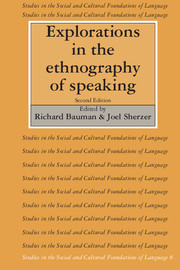Book contents
- Frontmatter
- Contents
- INTRODUCTION TO THE SECOND EDITION
- I PREFACE AND INTRODUCTION
- II COMMUNITIES AND RESOURCES FOR PERFORMANCE
- III COMMUNITY GROUND RULES FOR PERFORMANCE
- Introduction
- 4 Warm Springs ‘Indian Time’: How the Regulation of Participation Affects the Progress of Events
- 5 Contrapuntal Conversations in an Antiguan Village
- 6 Norm-Makers, Norm-Breakers: Uses of Speech by Men and Women in a Malagasy Community
- 7 Speaking in the Light: The Role of the Quaker Minister
- IV SPEECH ACTS, EVENTS, AND SITUATIONS
- V THE SHAPING OF ARTISTIC STRUCTURES IN PERFORMANCE
- VI TOWARD AN ETHNOLOGY OF SPEAKING
- Notes
- References
- Index of names
5 - Contrapuntal Conversations in an Antiguan Village
Published online by Cambridge University Press: 05 June 2012
- Frontmatter
- Contents
- INTRODUCTION TO THE SECOND EDITION
- I PREFACE AND INTRODUCTION
- II COMMUNITIES AND RESOURCES FOR PERFORMANCE
- III COMMUNITY GROUND RULES FOR PERFORMANCE
- Introduction
- 4 Warm Springs ‘Indian Time’: How the Regulation of Participation Affects the Progress of Events
- 5 Contrapuntal Conversations in an Antiguan Village
- 6 Norm-Makers, Norm-Breakers: Uses of Speech by Men and Women in a Malagasy Community
- 7 Speaking in the Light: The Role of the Quaker Minister
- IV SPEECH ACTS, EVENTS, AND SITUATIONS
- V THE SHAPING OF ARTISTIC STRUCTURES IN PERFORMANCE
- VI TOWARD AN ETHNOLOGY OF SPEAKING
- Notes
- References
- Index of names
Summary
The conventions which order speech interaction are meaningful not only in that they order and mediate verbal expression, but in that they participate in and express larger meanings in the society which uses them. This paper attempts a look at a particular structure of conventions and associated meanings in Antigua, West Indies.
George Lamming, the West Indian writer, opens his book The Pleasures of Exile with a quotation from Shakespeare's The Tempest – a play which he discusses at length in the book as a symbol of the cultural relations of the metropolitan countries with their Caribbean colonies:
Be not afeard; the isle is full of noises,
Sounds and sweet airs, that give delight and
hurt not.
The word ‘noise’ has unfamiliar meanings here – and the ambiguities that result may serve us, as I feel they often do West Indians, to characterize and to symbolize both the structure and the ambivalent value of certain central patterns of West Indian speech.
Lamming himself is aware of these ambiguities. Of a West Indian politician in England he remarks, ‘He would shout his replies when the devil's disciples came to heckle. And that is as it should be; for there is no voice which can make more noise in argument than the West Indian voice’ (1960:91). And of himself, ‘So I made a heaven of a noise which is characteristic of my voice and an ingredient of West Indian behaviour’ (1960:62).
- Type
- Chapter
- Information
- Explorations in the Ethnography of Speaking , pp. 110 - 124Publisher: Cambridge University PressPrint publication year: 1989
- 11
- Cited by

